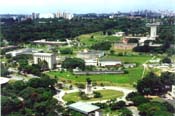
 
 
 
 
|
|
Goals
Our main goal is to use mathematical and technological
knowledge to create new signal processing solutions
for important industrial and scientific problems.
We are interested in
- developing algorithms that are well suited to the
kind of hardware in which they will be employed -
general-purpose computers, digital signal processors
(DSPs), or custom or semi-custom hardware (FPGAs or
ASICS);
- deriving mathematical models to better understand
new and available algorithms, and to lay down the
path to the development of new and better methods.
Examples of tools and applications:
- Array processing: estimation of acoustic images
(maps of sound intensities) with microphone arrays.
- Adaptive filters: echo cancellation (cell phones),
system identification (control).
- Sparse identification methods: solving systems with
less equations than unknowns.
- Digital filters for sample-rate conversion in audio
systems.
- Estimation and classification algorithms for
structural health monitoring (detection of defects in
mechanical structures).
Examples of mathematical tools frequently used: linear
algebra and matrix analysis, probability, statistics and
stochastic processes, transforms, and creativity.
Examples of hardware platforms: DSPs, FPGAs,
general-purpose computers, GPAs.
Current research and development partnerships:
EMBRAER,
University of York.
|
 Adaptive Filtering and Estimation Group
Adaptive Filtering and Estimation Group 







